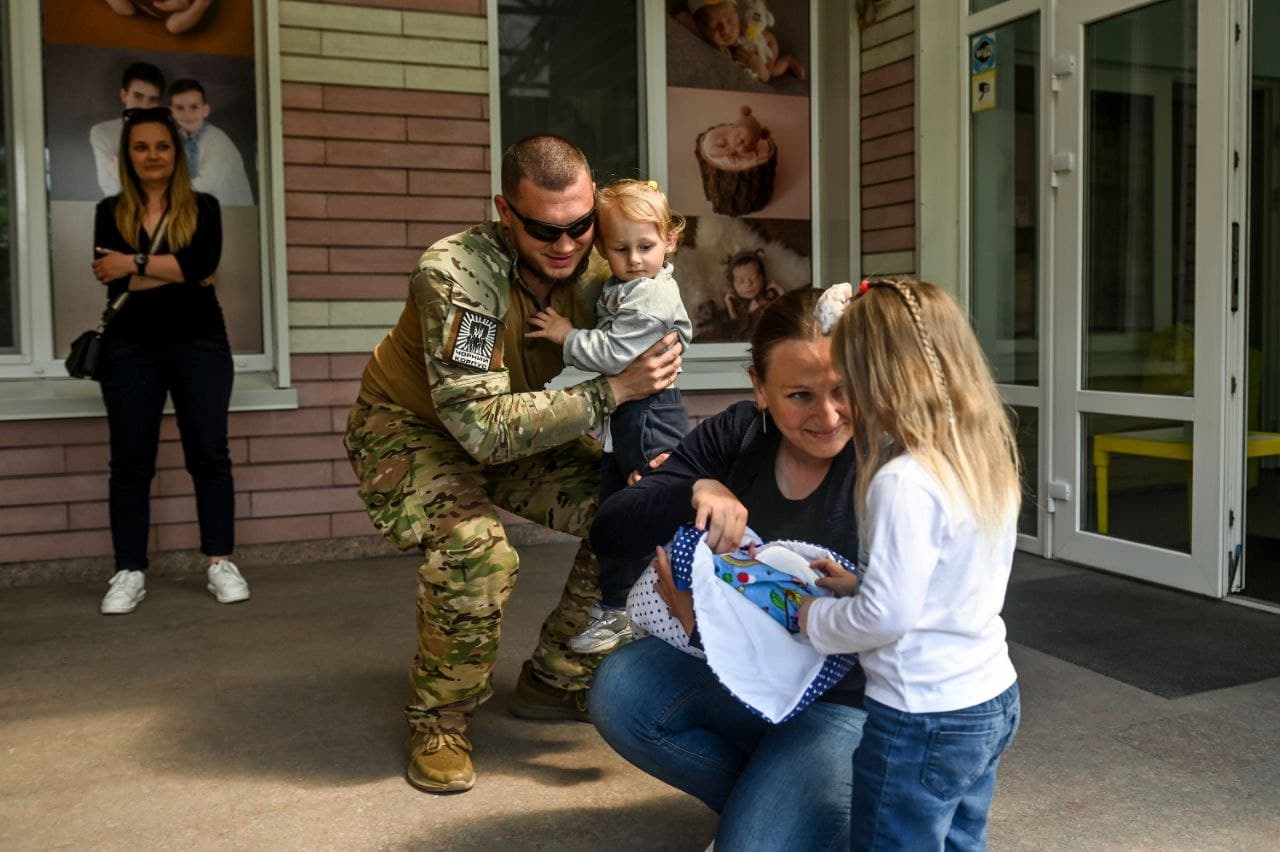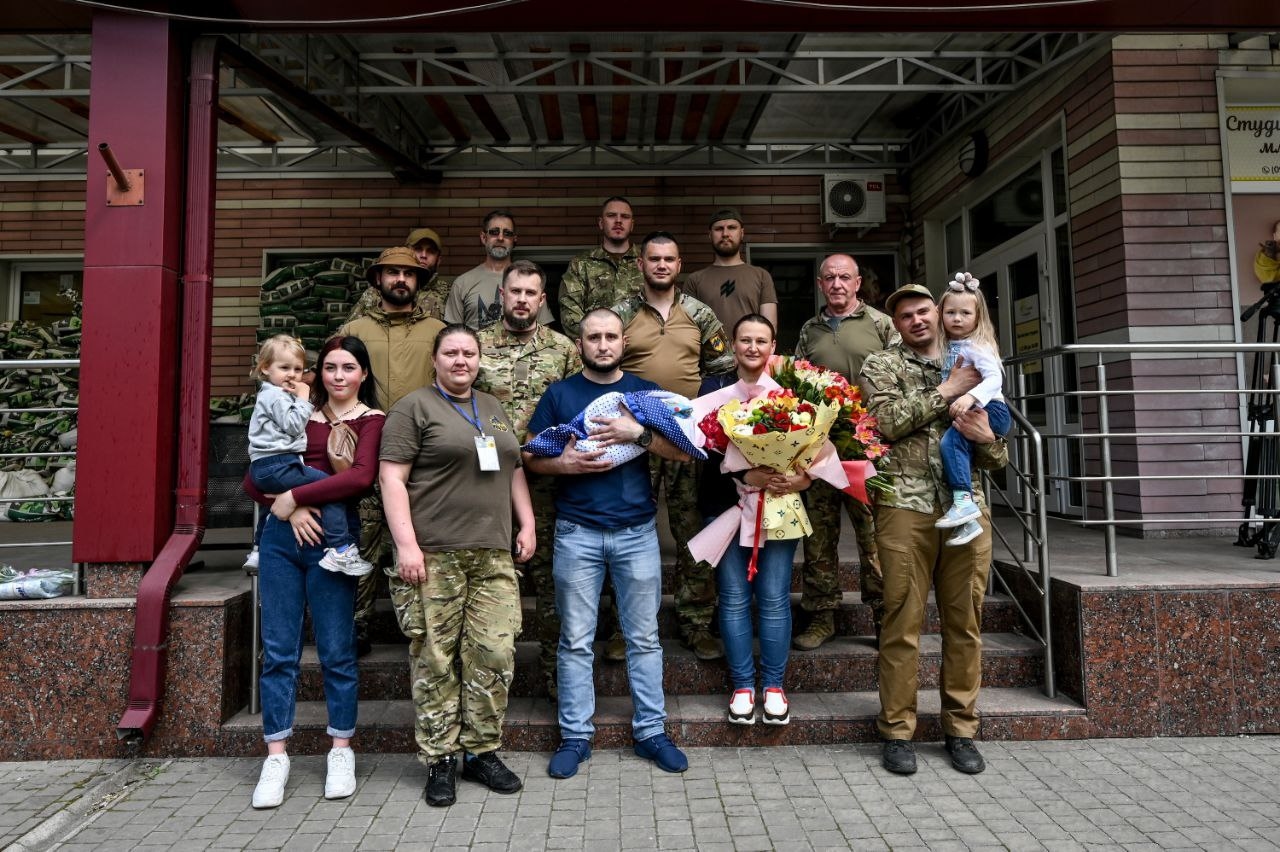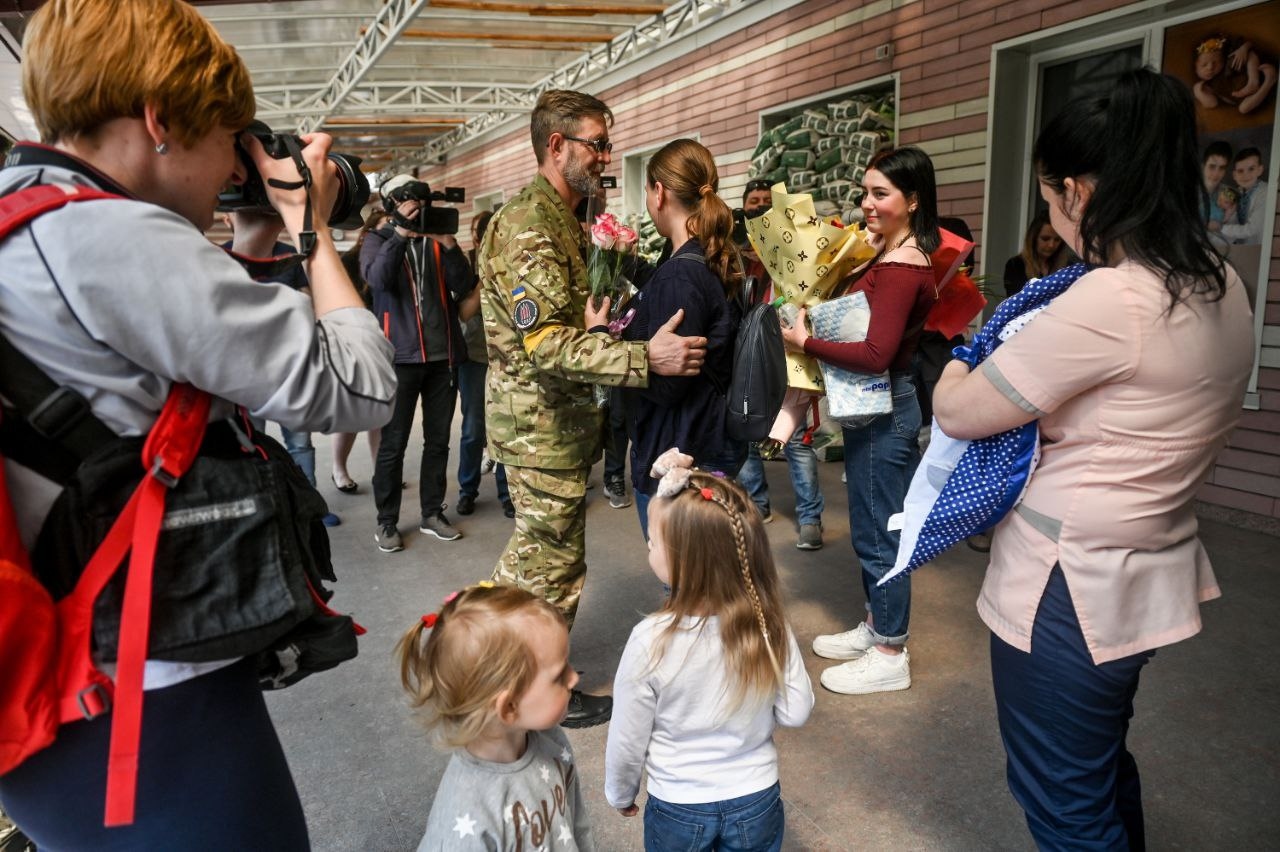Mom of 3 loses husband, mother to Russia’s war: ‘My children will know they were heroes’

On a warm day in mid-May, Ukrainian Tetiana Lastovych, 29, was getting ready to be discharged from the maternity hospital in the city of Zaporizhzhia after giving birth to her third child, a baby boy Illia.
As she approached the glass doors to the hospital, Lastovych froze in shock: There was a crowd of Azov Regiment soldiers waiting to greet her and her newborn baby.
They got together to celebrate a new life. Lastovych was happy to see them. But it was a bittersweet moment: The two people she wanted to see the most in that moment were not in the crowd.
Weeks before she gave birth, her husband, Azov regiment soldier Oleksiy Lastovych, was killed in combat defending the southeastern Ukrainian city of Mariupol from Russian forces. He was 34.
Shortly after, a Russian airstrike on the Azovstal steel plant in Mariupol killed her mother, the Azov regiment’s psychologist, 51-year-old Natalia Luhovska. She died just days before their long-awaited grandson was born.
Azovstal was the last Ukrainian stronghold of Mariupol, a city with a pre-war population of 450,000 people, destroyed by Russian troops. Thousands of Ukrainian fighters, including the Azov regiment, defended the plant with little or no resources at all. Refusing to surrender for nearly three months, Azovstal became a symbol of Ukraine’s fierce resistance in the face of Russia’s invasion.
Lastovych still hasn’t had the chance to say goodbye to her loved ones. Their bodies have not yet been returned.
“It took all my inner strength to give birth without thinking about it,” Lastovych says.
Just as her husband always dreamed, she named their baby boy Illia. “He looked like my mother at first, but now he’s starting to look just like his dad,” she says.
Illia is almost two months old now. Even though he will never get to meet his father or his grandmother, he will know what price they had to pay for the freedom of their homeland, Ukraine.
“This is what I’m holding on to, the need to tell my children what they did,” she says. “They will know what heroes their relatives were.”
United by Azov
It was not just her husband and mother that Russia’s war took away from Lastovych.
Her younger brother, Yurii Luhovskyi, was also killed while defending Ukraine.
Luhovskyi was a participant in one of the most crucial events in Ukraine’s history, the 2013-2014 EuroMaidan Revolution, which ousted pro-Kremlin ex-President Viktor Yanukovych. He was there from day one, his sister says.
“He was a real warrior,” she says, adding that soon after the start of Russia’s war in Ukraine’s Donbas back in 2014, Luhovskyi joined the Donbas Volunteer Battalion and headed to eastern Ukraine to fight against Russian aggression. He eventually became a sniper, Lastovych recalls.
Luhovskyi, also known by his military nickname “Barret” was a “real legend, the best sniper, known and feared by his enemies,” according to fellow soldiers.
He participated in heavy fighting in Ukraine’s hottest spots including the tragic Battle of Ilovaisk in August 2014, a bloody slaughter that killed hundreds when Russian forces ignored an agreement for a green corridor and opened fire on Ukrainian forces as they evacuated. Luckily, he wasn’t one of them.
Later, Luhovskyi joined the Azov Regiment, part of Ukraine’s National Guard that is known as one of Ukraine's best-trained and effective combat units.
Lastovych says he was one of those soldiers who could “forget to sleep and eat” but never refused to fight.
A young and promising defender of Ukraine, Luhovskyi was killed in a “sniper duel” near the village Vodiane, Donetsk Oblast, in March 2018. He was 23.

“He killed two (Russian) snipers at the cost of his life,” Lastovych says.
To cope with the loss of her son, Natalia Luhovska decided that there was no better remedy than to support those who fought shoulder to shoulder with him. She joined Azov as a psychologist shortly after her son’s death.
Soldiers from all across the frontline came to Natalia not only to get support but to share their stories about her son, the famous “Barret.”
“I saw how she enjoyed those stories,” Lastovych says. “She needed to hear about him from the boys.”
Lastovych says her mother was a very kind and caring person. Even her military nickname “Romashka” (“Chamomile”) reflected that. For helping soldiers find comfort in the darkest hours, they often referred to her as “mama Natalia.”
Azov soon became Luhovska’s second family. Having heard of the regiment from his brother-in-law and other soldiers, Lastovych’s husband Oleksiy Lastovych, a Ukrainian border guard serviceman at the time, joined Azov in 2019.
“They were all united by Azov,” Lastovych says.
They all moved to Mariupol, where Azov was based and where for several years Lastovych, her husband, children, and mother had the chance to live a “beyond happy life.”
A life that Russia ruined
Lastovych served as a border guard in her native Chervonohrad, a town in Lviv Oblast, where she met her future husband.
By that time, she already had a little daughter from her first marriage. Together, the family moved to Novotroitske, a village in Donetsk Oblast where Oleksiy served back then, and later in 2019 to Mariupol.
They bought a cozy house in the coastal Yalta village, some 30 kilometers west of Mariupol. There, Lastovych gave birth to their second child, a baby girl Viktoriia.
The Lastovych family lived the life they had dreamed of: They were close to the seaside and had chickens, goats, and rescue dogs and cats.
Every night after coming home, Oleksiy would spend hours playing with his kids and pets.
“I understand now how happy we were,” Lastovych says.

But the start of Russia’s all-out invasion of Ukraine ruined everything.
Lastovych learned the news of the invasion on the morning of Feb. 24 when her husband called her. He said that the family needed to leave Yalta as soon as possible.
Shortly after, Russia started to attack Mariupol. “It was such heavy shelling that our house, 30 kilometers from Mariupol, was shaking,” Lastovych says.
Her husband was called to defend the city immediately. But before heading there, Oleksiy and some of his fellow soldiers came back to pack. The soldiers were in a hurry, so Lastovych only waved goodbye to him as he left.
It was the last time she and the kids saw Oleksiy alive.
On Feb. 25, then seven-month pregnant Lastovych took their children and pets and fled to a town in Zaporizhzhia Oblast where Oleksiy’s mother lived.
Never forget
For three weeks in March, Lastovych lost connection with Oleksiy while he was on a combat mission in Mariupol. She was only able to reach him once he was on his way back to Azovstal.
“I understood that asking him about any details was forbidden, and he wanted to rest at least for some time from that nightmare,” Lastovych says. “So I would tell him funny stories about children, to try to cheer him up.”
Thanks to Elon Musk’s Starlink satellite internet at Azovstal, Lastovych was able to stay in touch with her mother. Although they could not discuss much over the phone, Luhovska told her that people hiding there were running out of drinking water and food and had to live under almost never-ending shillings and airstrikes.
“That constant rumbling, constant vibration from shells, and the constant expectation of death — it was very difficult for them,” Lastovych says.
But the area where Lastovych came to escape Russia’s war was dangerous too: It was occupied by Russian troops in early March.
“Food started vanishing from the stores,” Lastovych recalls. “Getting goods for children was almost impossible.”
She spent nearly two months living under Russian occupation. All this time Lastovych feared that Russians would identify her as the wife of an Azov soldier. She knew how much they hated the regiment.
When Lastovych finally decided to escape again in late April, she spoke with Oleksiy on the phone to discuss safety precautions. Despite the topic of the conversation and the circumstances, the couple was, as usual, happy to hear each other’s voices, Lastovych says.
Two days after that phone call, Oleksiy was killed.
Lastovych still doesn’t know any details of his death. She believes he was killed in Mariupol, and his fellow soldiers took his body back to Azovstal.
As she grieved her partner, Lastovych had to pull her strength together and get out of the Russian-occupied town as soon as possible. Identifying her became much easier after her husband’s death.
“I realized that the news of his death would be all over the internet soon, and people would start posting photographs of us with the kids,” she says.
She found a driver, destroyed her military ID, took the kids, pets, and her fallen husband’s niece and headed to the Ukrainian-controlled city of Zaporizhzhia.
Nearly 60 civilian cars were trying to leave the Russian-occupied town that day, Lastovych says. But they were the only ones who managed to get out.
“There is a woman in labor,” she recalls one driver screaming to Russian soldiers at checkpoints, hoping they would let them pass.
That stressful journey took 12 hours instead of the regular four. Thanks to a local man who was in a car with them, they found a dirt road that led to the Ukrainian checkpoint and escaped.
She confessed to the driver she was a wife of an Azov soldier only after they drove into Zaporizhzhia.
“He just crossed himself” and said he was “happy that it was over.”
Just as they had found a new home in Zaporizhzhia, Lastovych received more terrifying news: Her mother was killed in a Russian airstrike of Azovstal.
“I was told that the powerful blast hit her and another girl against the wall,” Lastovych says. “They died instantly.”
A widow of a “man of steel,” Lastovych says she didn’t let the grief break her: “They wouldn’t want it to,” she says.
On May 10, she gave birth to their baby boy Illia.
Now, she wants her children to have the same “strength to fight until the end” just as their father, grandmother, and uncle did. As soon as her kids grow older, she will tell them about the heroic deeds of their relatives.
“I will tell them how they gave their lives defending their country,” Lastovych says.
“What they did will never be forgotten.”











